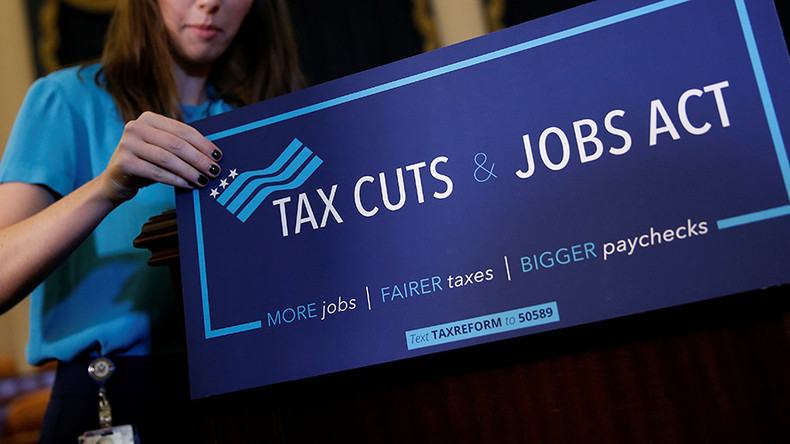Republicans and Tax Reform
After losing big in the Cotton state last week, Republicans are feeling the pressure now more than ever to secure seats and their super majority ahead of the 2018 midterm elections. The GOP is working overtime to deliver tax reform to Trump in advance of the Christmas break. At the time of this piece, the House successfully passed the Tax Cuts and Jobs Act bill. The Republican tax bill is the most sweeping rewrite of the tax code in roughly three decades.
In this edition of “how a bill becomes a law”, the tax bill is now sent to the Senate, where it is expected to pass with little fanfare and then head to Trump’s desk for his John Hancock. For Republicans, the passage of this bill is a success, not just for the GOP but for Trump, who campaigned on rewriting the tax code during his first year in office.
Keep in mind, the passage of the GOP tax reform is not only the largest overhaul since 1986, but is one of the largest legislative wins for Republicans since gaining control of the government last November. After a turbulent few months for the Grand Old Party, Tuesday’s passage of tax reform offers a new hope in time for the new year, which, if we are being honest, this was beyond needed.
After suffering election setbacks, the tax reform bill was imperative for Congress to pass if the Republicans wanted a fighting chance in the midterm elections. While the MSM has all but written off the Republican party and the president as being able to get things done in the ‘swamp’, the GOP showed up and rammed through a new tax code with lightning speed.
Historically speaking, the last tax overhaul which had bipartisan support did not reach Reagan’s desk until a year after it was initially introduced in the House. The distinct difference between 1986 and 2017’s tax bill is bicameral support. Public polling shows Americans support hovering at less than 30%. The lack of public support shows a PR crisis on the horizon as Republicans will have to work on fending off rumors that their plan panders only to corporations and the wealthy.
At this time, it would serve the GOP to avoid popping bottles and opt for a more modest celebration, because word on the street is they are going to have an uphill battle with voters in the upcoming elections. Treated as an apocalyptic event, Democrats have no doubt become a dog with a bone and begun to sharpen their talking points as they prepare for the 2018 cycle.
However, the future under the tax bill is not as bleak as Democrats would want the American public to believe. Based on recent findings by the Tax Policy Center, corporations are not the only beneficiaries of the bill’s cuts in tax rates. Rather, the bill cuts tax rates across all seven tax brackets, doubles the standard deduction (while eliminating the personal exemption), expands the child tax credit, and alters the alternative minimum tax so that it will affect fewer people. In a nutshell, the plan reduces taxes for every income group, and roughly only five percent of taxpayers would pay more next year.
There is one caveat to the glory of Americans saving more money come tax time — the provisions for individual tax reductions along with the doubling of the standard deduction are set to expire in 2025. The expiration date of 2025 helps the bill to avoid increasing the country’s deficit by more than $1 trillion over the next decade. Republicans (*cough* Paul Ryan *cough*) justified this provision by explaining that no future Congress would let them expire and allow taxes to rise on the middle class. If only predicting Congressional action in the future were this easy (hint: it’s not).
This hefty prediction does have some validity. A large majority of temporary tax cuts passed under President George W. Bush were made permanent under President Obama. However, there is one small glitch. If the provisions do not expire, then the bill will increase the deficit far more than projected. It is enough to make even the wonkiest of policy folks groan, and most Americans reach for more eggnog.
Overall, the Tax Cuts and Jobs Act is the GOP’s version of a basic white girl plan to cut taxes without reducing spending. By giving the tax code a face lift on some parts, the tax bill also inflames America’s long-term problems. On a broader spectrum, the haste in which the GOP has rammed through this legislation has not only set a bad precedent and muddied the waters when it comes to the SOP of policymaking, but they have shown a blatant disregard to reach across the aisle to find a solution that works for both parties, including the American people.
Unfortunately for the GOP, their mean girl behavior has left a bad taste not just with Democrats but also many Americans. As such, it is safe to predict that Republicans will spend much of 2018 on a PR tour working hard to win back the hearts and minds of moderate voters and try to convince the middle class they did right by them; but the reality is, voters will not truly know how much this will cost them until 2019.
Republicans may have gotten the votes, but the American voter will get the last say in 2018.

